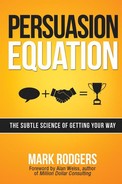FOREWORD
I vividly remember a phone call in 1985, when a woman I didn’t know asked if I was Alan Weiss.
“Yes, I am,” I said.
“And do you own a Mercedes 450 SLC?” she asked.
“Yes, I do,” I admitted, expecting perhaps a factory recall advisory.
“Well, how would you like to own one of the very first car phones in New England?” she prompted.
“I’m free this afternoon,” I said, and I acquired a hard-wired handset, which was the first of the phones in every car I subsequently owned until the advent of cell phones.
I remember this so clearly because it was the last “cold call” purchase I ever made, and because it was so elegantly simple. Today, we’d call that series of questions and answers “consistency,” since it relies on a continuing affirmative response. I simply called it “Wow!”
Persuasion takes many forms, but the underlying principles are clear: We should seek commitment, not merely compliance; speed is highly desirable (the longer you wait, the more bad things happen); and finding others’ self-interests and adapting to them is essential.
Mark Rodgers is the expert in persuasive powers. He is a veteran consultant, working with major corporations. He’s a previously published author. And he’s a superb coach. In this book, he’s distilled the key techniques to galvanize others and marshal their support. You’ll learn in the pages that follow that there’s a momentum in passion that can be maneuvered in your favor, just as an expert in martial arts can move a larger opponent using the other’s momentum.
Too many managers believe that they are trying to convince when they are actually trying to coerce. They seek to influence behaviors rather than change beliefs. Their thinking is self-centered rather than other-centered. Hierarchical power can command but not necessarily persuade. These are subtle but powerful distinctions, which the reader can ignore only at great peril.
We see the lessons every day. A president and Congress at an impasse, with no one seemingly able to reach a compromise. Yet we know it’s possible within either party, since both Ronald Reagan and Bill Clinton were superb at finding the grounds to enact legislation with bipartisan support. We seem to live in a polarized world, where there are “social media” but not “business media,” and people are encouraged to take sides and take up causes rather than take an open view and find the means to make things work. The “social” aspect of social media seems to be entirely false.
How important is persuasion amid these trends? I’ve been consulting for 30 years and visited 60 countries, and I’ve never seen an organization with unhappy employees and happy customers. I’ve never failed to see unhappy customers persuade others not to patronize their object of dislike. Yet, I’ve often stood at Fifth Avenue and 60th Street in New York City to watch 1,000 people line up to get the very first of a new line of Apple products, which they could get at their leisure if they just waited a month. (And I’ve marveled at the Apple employees who emerge before the store opens to offer the crowd juice and snacks.)
Every day we are required to influence, recommend, cajole, nudge, suggest, advise, and threaten. We engage in these activities proactively to build consensus and support. We throw ourselves in reactively, because we’ve been wronged or tricked or had a march stolen on us. Politics, advertising, entertainment, health care—you name it, they rely on persuasion. Smoking has been reduced substantially, because the public has been persuaded both through education and appeals to personal needs (such as living to enjoy your grandchildren and not killing family members through secondhand smoke).
Persuasion can be macro or micro. The techniques and approaches Mark provides are brilliant because they are pragmatically useful every day. They can be used with coworkers or family members, in civic meetings or service settings. They are ubiquitous and powerful, yet stunningly simple to apply.
I invite you to enjoy the journey ahead, hoping that I’ve whet your appetite and persuaded you to pay close attention. I can’t imagine the day when I wouldn’t want to have a phone in my car, and I still thank that wonderful saleswoman who knew how to help me. Read on, and allow Mark to help you.
—Alan Weiss, Ph.D., author of 55 books, including
Million Dollar Consulting and Thrive!
